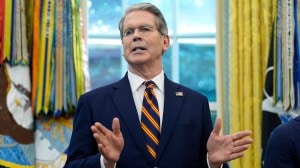Quiet start to public hearing on Lokpal Bill
Yes certainly. Both Sonia Gandhi and Rahul Gandhi are MPs.
You are talking about the Prime Minister. But what about extra-constitutional authorities like Sonia Gandhi and Rahul Gandhi? Does your legislation have provisions to deal with corruption by such people? asks a middle-aged man. Yes certainly. Both Sonia Gandhi and Rahul Gandhi are MPs. And MPs are covered under this law, says the moderator.
What do you plan to do about corruption in the media? And this recent incident relating to mistakes in the terror list handed over to Pakistan. I use to respect Chidambaram but wasnt this his duty to check the list before it was given to Pakistan? Shouldnt he be held responsible for the huge embarrassment this has caused to the country, asks an agitated old lady.
The moderators are slightly puzzled as they try to answer. Well,media is not treated as a separate group in this bill. But media is essentially a corporate house. And there are provisions for dealing with corporate corruption. I certainly think that misleading people with false or slanted information does amount to corruption. On your other point,we are still in the process of discussing how to incorporate negligence into this act, they answer.
The first public hearings on the Jan Lokpal Bill a proposed legislation drafted by civil society activists for establishing the office of Lokpal to fight corruption turned out to be a quiet affair in sharp contrast to the activity that had surrounded the anti-corruption campaign at Jantar Mantar.
Of the three hearings that happened in Delhi on Sunday,the one at Narela addressed by Swami Agnivesh drew a crowd of about 150. The other two,at Maujpur and Rohini,attracted less than 50 people each.
The people were shown a 40-minute video in which Arvind Kejriwal,one of the non-government representatives on the joint drafting committee,explains the provisions of the bill currently under discussion. A form was distributed asking for suggestions on specific issues like whether the office of the Prime Minister should be within the ambit of the Lokpal or not.
The meetings meant different things to different people. Immediately after the hearing started at Narela,a so-called president of the Federation of Narela Subcity,Joginder Dahiya,distributed his visiting card that had several lines of niceties on anti-corruption written on it. Some people gave long speeches on corruption. Some others spoke about their personal experiences with corrupt officers.
Both at Narela and Maujpur,the communication was mainly one-way with representatives of civil society doing most of the talking. At Maujpur where the meeting was conducted by a sub-inspector of Delhi Police and his social activist wife people talked about the need to call meetings at regular intervals to know what was happening to money meant for works in their locality. There were hardly any queries or suggestions from the audience on the Jan Lokpal Bill.
The meeting at Rohini was much more interactive and a number of residents of nearby areas spoke to give their suggestions. One person wanted to know why social workers are not a part of the selection committee of the Lokpal while another spoke of the need to ensure that the misuse of the proposed legislation is prevented.
But as some residents raised issues that were not connected with corruption,one speaker sort of summed up the discussions. Everyone wants to solve their day to day problems with the Lokpal act. That will not happen. The Lokpal is not meant to address your everyday problem. It is only an anti-corruption measure.
The civil society groups hope to incorporate the suggestions and comments received from the public to strengthen the provisions of the bill to make it more effective. Sundays public hearings were conducted solely on the initiative of the civil society groups and did not have the official sanction of the joint drafting committee.
Photos





- 01
- 02
- 03
- 04
- 05


























